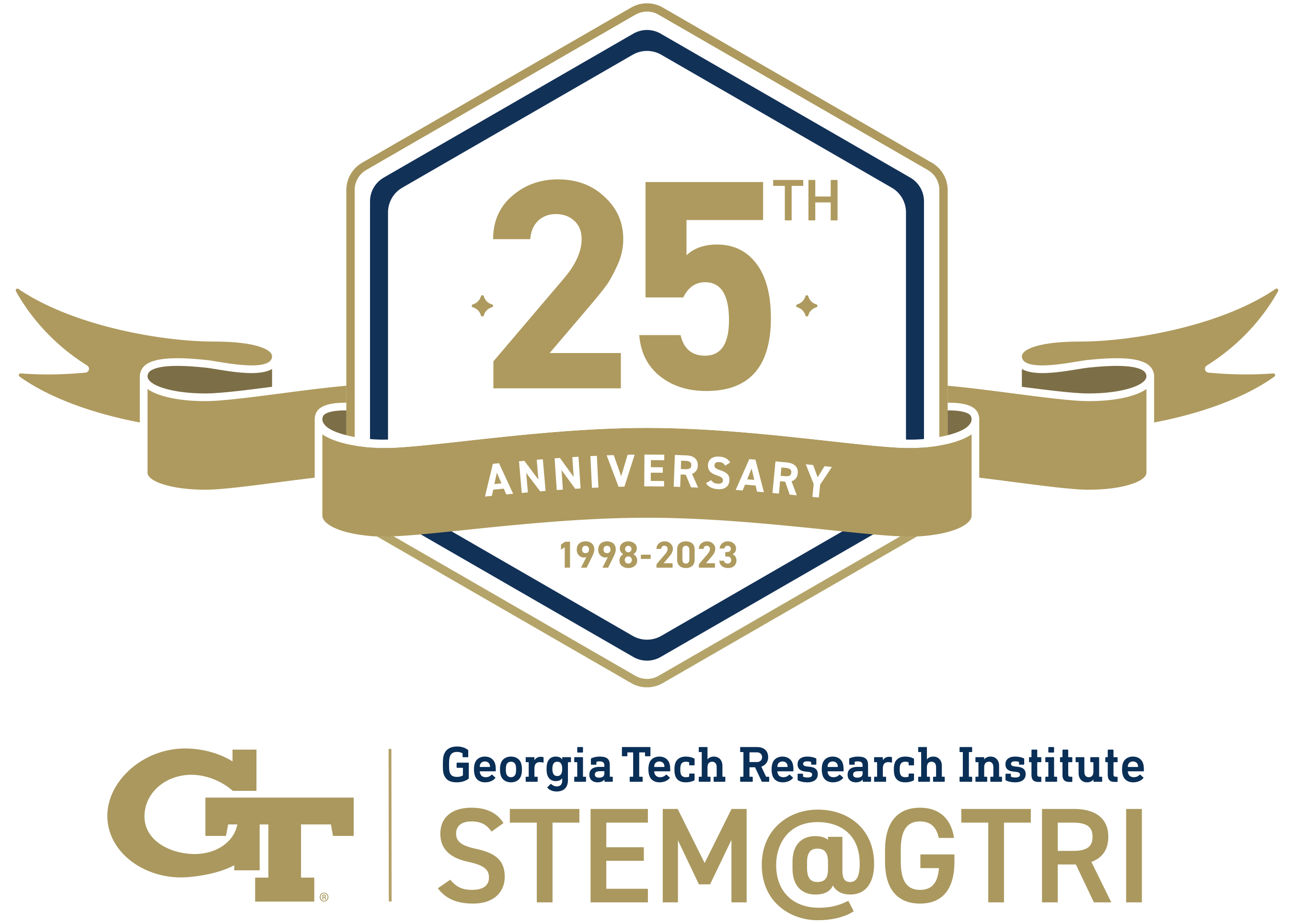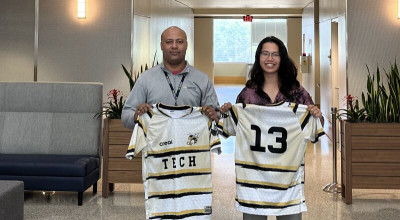
STEM@GTRI is the Georgia Tech Research Institute's K-12 outreach program. STEM@GTRI strives to inspire, engage, and impact Georgia's students and educators through hands-on experiences, outreach, and professional learning.
STEM@GTRI customizes professional development experiences for educators, connects students and classrooms to Georgia Tech labs and researchers, and brings hands-on, fun, and relevant programming to STEM (science, technology, engineering, and math) educational outreach events across Georgia. STEM@GTRI leverages State of Georgia funding through grants and partnerships to bring additional STEM programming to K-12 students in Georgia.
This month, STEM@GTRI will celebrate its 25th anniversary. 1998 is when the program started receiving State funding. To commemorate this auspicious occasion, STEM@GTRI will host a luncheon celebrating 25 years of K-12 STEM outreach at GTRI. During the program, we will reflect on the STEM@GTRI program over the past 25 years and its impact in Georgia and on the future of students.
STEM@GTRI 25th Anniversary Luncheon Details
Date: October 19
Time: 11:30 a.m. - 1:30 p.m.
Location: Georgia Tech Alumni House, 190 North Ave. N.W. Atlanta, GA 30332
STEM@GTRI’s Philosophy: INSPIRE. ENGAGE. IMPACT.
STEM@GTRI operates under a simple three-word credo: Inspire. Engage. Impact.
INSPIRE: Student Immersion
GTRI provides opportunities for students to immerse themselves in STEM fields through internships and outreach.
ENGAGE: Classroom Instruction
GTRI brings the excitement of real-world research to classroom engagements throughout Georgia.
IMPACT: Teacher Professional Development
GTRI equips teachers to educate their students about current and future opportunities in STEM fields.
A ‘Bird’s Eye’ Look at STEM@GTRI’s Recent Activities
STEM@GTRI, through its various initiatives, partnerships, events, and resources, indefatigably endeavors towards embedding STEM education within a practical, globally relevant, and continuously evolving context, thereby nurturing a future generation of innovators, scientists, engineers, and technologists who are well-versed in not just the theories, but also the pragmatic applications of STEM learning. Through events and collaborations, such as those with local schools and other educational initiatives, STEM@GTRI solidifies its commitment to providing practical, hands-on experiences and opening up innovative platforms for both students and educators.
Promoting and Celebrating STEM Achievements
STEM@GTRI is relentless in promoting and celebrating STEM-related achievements within the educational community. This is evident from the recognition given to schools like McGarity Elementary for achieving @STEMGeorgia certification, with the significant support from high school Chief Science Officers, which not only showcases STEM@GTRI’s commitment to supporting educational advancements but also their keenness in fostering and celebrating academic achievements within the STEM framework.
Engaging and Supporting STEM Education through Events and Resources
Another key facet is the organization's endeavor to keep STEM education both engaging and accessible. Various events and resources are made available, such as the end-of-the-year STEAM Challenge, which motivates students to apply their accumulated STEM knowledge in crafting solutions for real-world issues. There’s also an emphasis on providing resources for STEM learning experiences even when students are outside of school, thus ensuring continuity in student engagement with STEM activities outside the traditional learning environments.
Offering Real-World Opportunities for Students
Opportunities like high school summer internships that enable students to work alongside GTRI faculty and staff also spotlight STEM@GTRI's dedication towards not just theoretical, but also practical, experiential learning. By providing avenues where academic knowledge is transposed into real-world applications, students are offered a preview and experience of professional STEM applications, further bridging the gap between education and practical implementation.
One of STEM@GTRI's primary activities is the High School Internship Program. The STEM@GTRI High School Summer Internship Program is a paid, five-week internship where Georgia students have the opportunity to work alongside and be mentored by GTRI faculty and staff. On July 21, individuals and teams of students gathered at GTRI Headquarters and gave presentations on projects they conducted as part of the STEM@GTRI High School Summer Internship Program. The projects completed by the students were not typical, simple, “science fair” fare. The students used cutting-edge technologies to tackle real-world problems in areas such as agricultural technologies, artificial intelligence, astronomy, cybersecurity, health care, and weather/climate. The Internship Program is more than a mere “summer camp.” It is highly competitive. This year, only 66 students were selected out of an applicant pool of around 800 high schoolers. The interns were hosted in GTRI labs and units across the Atlanta campus, Cobb County Research Facility (CCRF), and Warner Robins Field Office (WRFO).
Workshops and Professional Learning
STEM@GTRI also pays substantial attention to elevating educational strategies and ensuring that the academic and professional communities are symbiotically enriched. The collaborative workshops, for instance, with Paulding County and other educators, reflect a strategy that is as much about enriching the knowledge and skills of educators as it is about direct student engagement. By assisting and collaborating on designing STEM Professional Learning opportunities for teachers, they ensure a cyclic enrichment of the teaching-learning ecosystem within the STEM paradigm.
Continual Learning and Application
Recurring events and initiatives, such as the Direct to Discovery Design Challenge series and activities that leverage the expertise of researchers to bring real-world scenarios into the classroom, highlight a continual emphasis on not just learning, but applying. The goal seems to be to inspire a generation of thinkers, doers, and innovators who are as adept at understanding STEM concepts as they are at applying them to address real-world challenges.
Global and Universal Connections
In addition, by reposting and integrating global and universally relevant content such as astronomical events, environmental observations, and more from national entities such as NASA, STEM@GTRI not only aligns itself with global scientific happenings but also encapsulates a broader, interconnected vision of STEM that transcends beyond localized applications and learning to a more global and universal context.
Bridging STEM and Esports
Esports, an emerging and fast-growing industry, also finds a notable mention, hinting towards STEM@GTRI's perception of it as an avenue through which technological and scientific learning can be further propagated among the youth. By linking STEM with popular platforms like esports, it reflects a strategic move to integrate STEM learning within the frameworks of contemporary interests among students and educators alike.
Tracing How Far STEM Education Has Come Since STEM@GTRI’s Founding in 1998
As STEM@GTRI commemorates its impressive 25-year anniversary, let's take a brief look at some key developments in STEM education in the U.S. since 1998.
- 1998: The Internet and the “World Wide Web” were just becoming household names around this time. The Internet spurred a rapid evolution of technology. This further led to an emerging recognition of the need to integrate scientific learning within the national educational community to foster innovation and competitiveness.
- Early 2000s: STEM education really began to take shape. New initiatives, such as "No Child Left Behind" (2001), emphasized accountability and sought to enhance performance in science and mathematics across all grade levels.
- 2005-2007: The "Rising Above the Gathering Storm" report was pivotal in highlighting the urgency of investing in STEM education to preserve America’s global leadership,. As the report stated: “U.S. advantages in the marketplace and in science and technology have begun to erode. A comprehensive and coordinated federal effort is urgently needed to bolster U.S. competitiveness and pre-eminence in these areas.”
- 2009: The launch of the "Educate to Innovate" campaign by the Obama administration marked an important milestone in reinforcing STEM education, calling for heightened standards and improved methods for teaching scientific and technological concepts.
- 2010: The Common Core State Standards were introduced, including robust benchmarks for mathematics, aiming to ensure that students across states received a quality education that prepared them for the demands of a 21st-century economy.
- 2013: The Next Generation Science Standards (NGSS) were introduced, emphasizing scientific practices and knowledge integration, thereby providing a cohesive approach to K-12 science education with a focus on real-world applications.
- 2015: The Every Student Succeeds Act (ESSA) was signed into law, replacing "No Child Left Behind" and offering states greater autonomy in determining educational standards while maintaining a prioritized emphasis on STEM. It also codified a focus on “commitment to equal opportunity for all students.”
- 2016 - Present: Efforts were directed towards broadening STEM and making it more accessible.
STEM@GTRI has paralleled this national journey, developing, and delivering impactful and hands-on STEM experiences, connecting classrooms to real-world scientific applications, and fostering an enriched learning ecosystem that prepares the next generation of innovators. As we reflect on the past 25 years, STEM@GTRI stands as a testament to the powerful convergence of education, outreach, and innovation, propelling us into a future where STEM is not just a curriculum but an essential part of how we understand and shape our world.
Writer: Christopher Weems
GTRI Communications
Georgia Tech Research Institute
Atlanta, Georgia

The Georgia Tech Research Institute (GTRI) is the nonprofit, applied research division of the Georgia Institute of Technology (Georgia Tech). Founded in 1934 as the Engineering Experiment Station, GTRI has grown to more than 2,900 employees, supporting eight laboratories in over 20 locations around the country and performing more than $940 million of problem-solving research annually for government and industry. GTRI's renowned researchers combine science, engineering, economics, policy, and technical expertise to solve complex problems for the U.S. federal government, state, and industry.



